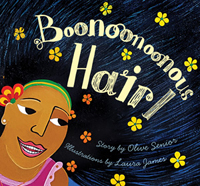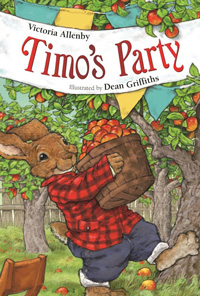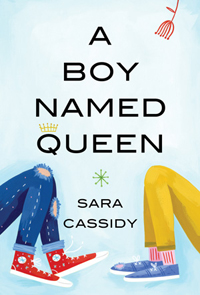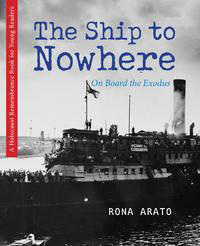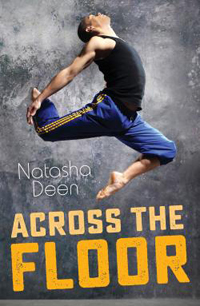New Fall 2016 Children's and YA Books! Part 1
By Susan Hughes
I’m delighted to be starting off my kid lit blog this season with a fun chat with five authors of exciting hot-off-the-press children’s books, including a picture book, a chapter book, a middle grade book, a nonfiction book, and a YA novel. Welcome to Olive Senior (Boonoonoonous Hair, Tradewind Books), Victoria Allenby (Timo’s Garden, Pajama Press), Sara Cassidy (A Boy Named Queen, Groundwood Books), Rona Arato (The Ship to Nowhere: On Board the Exodus, Second Story Press), and Natasha Deen (Across the Floor, Orca).
Susan Hughes:
I’ve asked you each to provide a question you’d like an interviewer to ask you. So, Olive, you first. You suggested you’d like to be asked this: Why do we write?
Olive:
Exactly! Why are we crazy enough to put ourselves through torture? Because the end result of a reader’s joy is the gift that convinces us to go back and do it all over again.
Susan:
Thanks. On to you, Victoria. You wanted to be asked ‘Why do you mix your prose with poetry?’.
Victoria:
Poetry is a gateway to language-learning. If you use rhythm and rhyme, kids can predict what words will fit into that rhythm and that rhyme scheme. If you use alliteration and assonance, they become familiar with the repeated syllables and can recognize them in unfamiliar words. If you use several synonyms together, they realize they all mean the same thing. All of this means that I can use slightly more challenging language than I could in straight prose, because the text is giving the reader clues about how to decode it. And it’s just plain fun.
To be honest, when I wrote Timo’s Garden, my first early chapter book, I was nervous about this mix-and-match approach. Would the critics think I was crazy? But the book ended up getting glowing reviews across the board, and Pajama Press encouraged me to keep writing about Timo and his friends. I was happy to oblige!
Susan:
And Sara?
Sara:
I hope interviewers will ask for a photo of my desk on a day that I have tidied it. My pens and pencils are in 200-year old pewter tankard from an English pub, a thesaurus and book of poetry are always within reach, in case I need inspiration. These days, an early 20th century photograph of the town of Nevers, France, where the YA novel I am currently writing takes place, is propped centrally. I work in a room at the top of the house that has windows on every side. It is like a captain’s lookout, and on stormy winter days, I am warm and feel like the luckiest person in the world.
Susan:
And so, let’s see it -- a photo of your desk on a day that you’ve tidied it!
Sara:
I tried to take a few photos, but they don’t do my working space justice. It feels a lot better than it looks!
Your CanLit News
Subscribe to Open Book’s newsletter to get local book events, literary content, writing tips, and more in your inbox
Susan:
So, we’ll just have to take your word for that, right? (smiles) … Now on to you, Rona. Can you tell us how your writing enriches the rest of your life
Rona:
Writing lets me explore new worlds. I learn through my research and expand my knowledge base.
Susan:
Natasha, you told me that you’re usually too busy admonishing yourself not to tell any corny grammar jokes to have any favourite/hope-they’ll-ask-me questions. But after pondering, you’d like to be asked, ‘What are some of the things regarding writing that might surprise folks to learn?’
Natasha:
There are a wealth of physiological and psychological benefits to both reading and writing — they make your brain more resilient to certain diseases, help you sleep better, and speed the healing process. It’s one of the many reasons I think writing is the coolest and strangest—mental telepathy, anyone?—things we’ll ever do. And it’s one of the many reasons I think everyone should write!
Susan:
My next question to all of you is, ‘What surprises you most about your writing process?’
Olive:
That I get anything done at all. Only romantics who are not writers think we spend all our day just writing. For me, writing gets squeezed into the spaces left by the daily round of earning a living.
Victoria:
I never know when writing is going to be easy or hard. My favourite method is to jot down some ideas in a notebook and then take it for a long walk; since even my prose often has a lot of rhythm, my footsteps become the background for new ideas as I work them out. Some days I come home with half a book drafted. Other days I just get some exercise.
Sara:
The subterranean connections between images and storylines that I discover after I’ve written – my unconscious at work. Also, how much room there is, to move things around, to add and to layer; a novel can hold a lot.
Rona:
Sometimes I guide my characters but often, they guide me. It’s amazing to have a character take charge and tell me where he or she wants to go.
Natasha:
I love that you asked this! For me, the most surprising thing about my writing process it’s that it has become harder with each book…I think it’s because with every story, writers look to give readers the best experience we can. We want to make our readers laugh, cry, groan, and feel good about having spent time with our novels. So, with each new manuscript, I want to do even better than the time before, to set the bar higher and see if I can reach it.
Susan:
Now, please name three books for children or adults you wished you’d written and briefly explain why.
Olive:
Alice in Wonderland by Lewis Carroll -- Has stayed with me all my life.
One Hundred Years of Solitude by Gabriel Garcia Marquez -- Awakened me early to the everyday intersection of magic and daily life.
Virtually anything written (for children or adults) by this deeply humanistic, comic, inventive genius, Terry Pratchett, whose fantasy worlds force us to constantly re-examine ours.
Victoria:
The Scorpion Rules by Erin Bow—Smart, political sci-fi that feels real
Each Peach Pear Plum by Janet and Allan Ahlberg—Simply perfect, perfect simplicity
The Boxcar Children by Gertrude Chandler Warner—the ultimate kids’ independence fantasy
Sara:
Field Notes from a Hidden City by Esther Woolfson. Her writing is her thinking.
Look At Me by Anita Brookner. Beautiful, bleak, slow, deep, sure.
Raymie Nightingale by Kate DiCamillo. Enviably nimble, poetic, bravely irreverent.
Rona:
The Diary of a Wimpy Kid by Jess Kinney because my grandkids love it.
A Tree Grows in Brooklyn by Betty Smith because it was the first adult book I read and I still love it.
Are You There God? It’s Me Margaret by Judy Blume because it broke new ground and opened a whole new world of Kidlit.
Natasha:
Ohhhh, nice challenge! I tossed down the question to my inner kid and came back with:
The Little Engine that Could by Watty Piper – Kick-butt chick takes charge.
Ramona the Pest by Beverly Cleary – You be you!
Then There Were None by Agatha Christie – Creepy mystery with unexpected twists.
Susan:
What are four or five of your favourite words?
Olive:
Indigo, masks, solitude, and invent.
Victoria:
Glimmer, bumble, fiddlesticks, and whimsy. I like words that taste good.
Sara:
Hod. Strop. Copse. Scoundrel. Liquid.
Rona:
Laughter, happy, mystery, and chocolate.
Natasha:
Yes, No, and these three strung together: have more dessert.
Susan:
Thank you! More to come in part 2.
Olive Senior is the prizewinning author of 17 books of fiction, non-fiction, poetry and children’s literature who lives in Toronto. Her website is www.olivesenior.com.
Victoria Allenby writes stories, poems, and flights of fancy from her home in Toronto, with strict supervision from Cole the Cat. You can learn more about them both at www.victoria-allenby-author.com.
Sara Cassidy is a poet, journalist, short story writer, and the author of several children’s books. She lives in Victoria. Visit her online at www.saracassidywriter.com.
Rona Arato is an award-winning author of 20 children’s books. She lives in Toronto. Visit her at www.ronaarato.com.
Natasha Deen is the author of several books for kids and teens, including Guardian (Moonbeam Award & CCBC Best Pick), Sleight of Hand (CCBC Best Pick), and the forthcoming Lark Holds the Key. When she’s not writing, she’s arguing with her pets over who is the real boss of the house. Visit her at natashadeen.com.
The views expressed by Open Book columnists are those held by the authors and do not necessarily reflect the views of Open Book.
Susan Hughes is an award-winning author of children's books — both fiction and non-fiction — including The Island Horse, Off to Class, Case Closed?, No Girls Allowed and Earth to Audrey. She is also an editor, journalist and manuscript evaluator. Susan lives in Toronto. Visit her website, www.susanhughes.ca.
